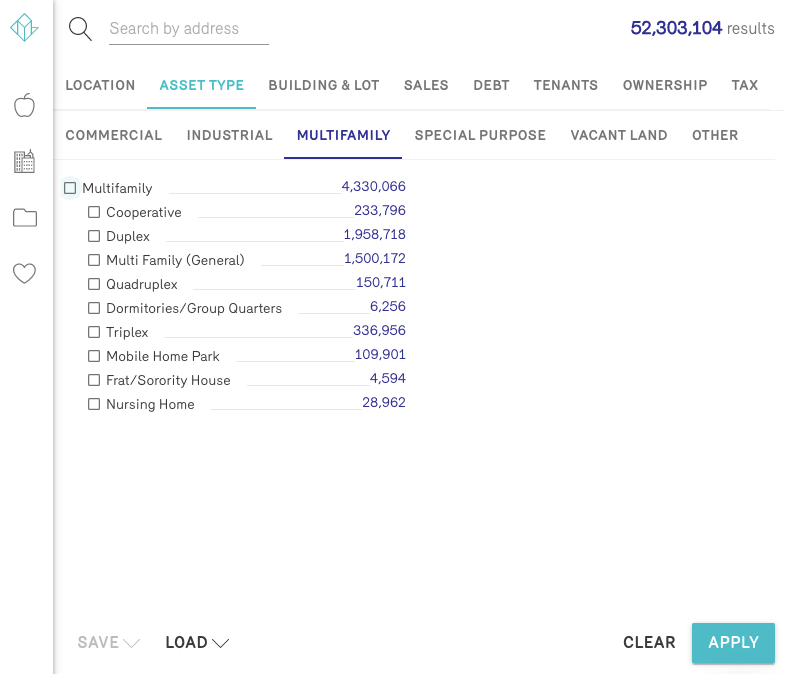How to find and connect with multi family property owners
A deep-dive into the ways you can find owners of multifamily properties across the US.

Multi family real estate is an asset type that is relatively easy to understand, underwrite, and profit from over time.
That’s why it has been a long-time favorite for investors of any size – from individuals looking to diversify their retirement portfolio to large institutional investors. The popularity of multi family real estate has also created the need for a large base of CRE professionals servicing the sector, including appraisers, lenders, brokers, contractors, and more. All these real estate professionals are actively looking for new multi family business, so they all need to be able to find and get in contact with property owners of the asset class.
In this article, we’ll show you the best ways to find owners of multi family real estate, access their contact information, and win their business.
How to find and connect with multi family property owners
There are a number of resources that you can utilize to find multi family property owners.
Many of the free search platforms depend on the property location. For example, some municipalities provide robust property and ownership information online for anyone to access. Other municipalities require people to submit formal requests for information, or to visit the local clerk’s office to pull the records themselves. Another option is paid platforms like Reonomy or ProspectNow, which allow you to search and find multi family property owners across the U.S. and access their contact information.
Let’s take a look at how you can locate multi family property owners using public records, Reonomy, and a few other sources, like local chambers of commerce and brokerage firms.
Public records multi family property owner search
Many people start a multi family property owner search by scouring the local public records because there is no fee to access them. Additionally, before the days of proptech, they were actually the most reliable option. If you have enough information about an owner, finding them through public records shouldn’t be a huge hassle.
Deeds and property assessment cards are generally the two public records documents that can help you identify the ownership behind a multi family property.
Registry of deeds
A deed is the legal document used to convey the ownership rights to a property. It usually contains the name of the seller (the Grantor) and the buyer (the Grantee). The deed will also specify the exact location of the property, the sales price, and the date the property was sold. Deeds are considered public records and are usually recorded at the Registry of Deeds, or in some places, with the County Clerk.
For example, if you want to find out who owns a multi family property in Boston, Massachusetts, you can visit masslandrecords.com and then select Suffolk County. From there, you can search for deeds based on owner’s or business name, address, document type (in this case, deed), or by date the document was recorded.
Tax assessor
Depending on the location, property taxes are collected at either municipal or county level. The taxing authority generally posts property tax records online where they can be freely accessed by the general public. These records can be easily retrieved by property address. Once you locate the property, the assessor’s database will usually indicate the name of the owner. In the example below, the assessor’s card indicates that 399 Congress LLC is the owner of record for the property at 399 Congress St. in Boston.
In order to find out the true owner of this multi family property, you’d then need to take your search one step further. To find out the individuals behind the owning LLC, you can search the state’s business entity database.
Alternatively, you can use a tool like Reonomy to see LLC owners and their contact information (more on that later).
Building department records
Another way to find multi family property owner information is to search the local building department’s records. For instance, if a commercial solar panel installer is interested in drumming up business amongst the owners of new multi family properties with at least 50 units, they can search the building department records to see what permits have been issued recently. If there are any new permits for buildings that meet that criteria, then the contractor can reach out to the owners listed on the approved building permits.
Local chambers of commerce
You could also possibly identify multi family property owners by reaching out to the local Chamber of Commerce near the subject property. Many commercial real estate owners are involved in their chambers, and the chamber may be able to help you connect with a specific multi family property owner.
Commercial property owners databases
If you’d like more advanced search options and more information on individual owners, you can turn to paid commercial property owners databases like Reonomy or ProspectNow.
Reonomy
The Reonomy web app can be used to do the following:
Search multi family property owners by name and/or address
Discover property owners based on their asset’s sale, debt, and tax history
Discover property owners based on the size and age of their asset(s)
Pierce LLCs and access the contact information of true property owners
These searches can be done in any U.S. location and for any asset type except single-family homes.
You can filter a search for a number of different multi family sub-classes, including duplexes, triplexes, mobile home parks, nursing homes, dorms, frat/sorority houses, and more.

ProspectNow
ProspectNow is an online database that provides information about multi family property owners, including their contact information. The platform also offers predictive analytics, which can help users identify which properties are most likely to sell in the next 12 months.
Commercial brokerages
Commercial real estate brokerage firms can also provide tremendous value to those looking for multi family property owner information in any geography. CRE brokers typically have a strong understanding of their local markets, know the major players, and can provide guidance based on the particular owner’s needs. Here are a few national multi family brokerage firms that have offices in cities across the U.S.
CBRE
CBRE’s Multi Family division is ranked as the #1 apartment brokerage firm in the U.S. by Real Capital Analytics. CBRE Multifamily provides investment sales and debt and structured finance services to multi family clients ranging from small private investors to large public entities.
JLL
JLL is another leading multi family brokerage that offers leasing, sales, and financing guidance to multi family property investors. The brokers at JLL are a great resource for those interested in finding multi family ownership information in any geography.
Marcus & Millichap
The Marcus & Millichap brokerage team is a leader in the private and institutional multi family investment sales market. Their National Multi Housing Group (NMHG) focuses on the private client market with transactions that generally range from $1 million to $20 million. The firm also has an Institutional Property Advisors team that specializes in transactions above $20 million.
These national brokerage firms tend to focus on the larger multi family product types. Smaller, independently owned and operated real estate companies can also be a great resource for those interested in identifying multi family property owners in the range of 1 to 10-unit buildings.
Identifying owner needs off-market
While discovering multi family property owners is a great start, access to additional insights can be incredibly helpful in deciding which owners to approach and how to position your pitch. Anyone who is looking to buy, sell, or service multi family properties may find the tools and resources in this section helpful.
Reonomy
In addition to the ability to search for specific property owners and their contact information, Reonomy allows you to thoroughly research properties and owners off-market to see whether they might be:
Likely to sell
Likely to refinance
In need of building services
Looking to buy more assets
A recent buyer/seller
Information on the building and lot, sales history, debt history, ownership, tax history, and much more can be found on each property’s detail page, along with the property owner’s phone numbers, email, and mailing addresses as illustrated previously.
ESRI
ESRI has a robust GIS mapping tool that can help commercial real estate professionals identify trends, patterns, and opportunities that would otherwise be difficult to uncover. For instance, GIS can provide valuable information about how a property is performing relative to comparable assets.
If an apartment building is leasing for lower rates than competitive properties in the neighborhood, a property manager may use the opportunity to pitch their services and help the owner reposition the property for greater success.
PolicyMap
PolicyMap is another useful mapping tool that allows users to view various data layers within a specific geography. You can monitor things like building permit violations or properties in default, which could represent an opportunity for an investor, developer, or even a lender willing to refinance a property at a better rate.
LandVision
LandVision provides multi family property information, including ownership details when available, to commercial real estate professionals in search of off-market opportunities. The platform also helps builders and developers with their due diligence processes.
National Association of Home Builders – Multifamily Council
The National Association of Home Builders has a Multifamily Council that represents members developing multi family housing of all types. NAHB is a great resource for individuals looking to connect with multi family property owners.
Zillow
Most people think of Zillow as a marketplace for residential properties, but the platform can also be a great tool for identifying multi family home owners with potential off-market needs. For example, Zillow can be used to search for recently sold multi family properties whose new owners may need property management, landscaping, HVAC, and a number of other maintenance services.
An alternative approach is to search for properties in pre-foreclosure, which means the lender has already initiated foreclosure proceedings. Pre-foreclosure properties are often in need of better property management, attorneys, and more.NOAA storm prediction center
Builders and contractors involved in multi family property restoration should consider using the NOAA/National Weather Service’s Storm Prediction Center. The platform provides real-time data about upcoming inclement weather, such as severe thunderstorms, tornadoes, flooding, and hurricanes. After severe storms, many multi family property owners find themselves in need of contractor support on short notice.
Author

Reonomy
Resources team
Author

Reonomy
Resources team



